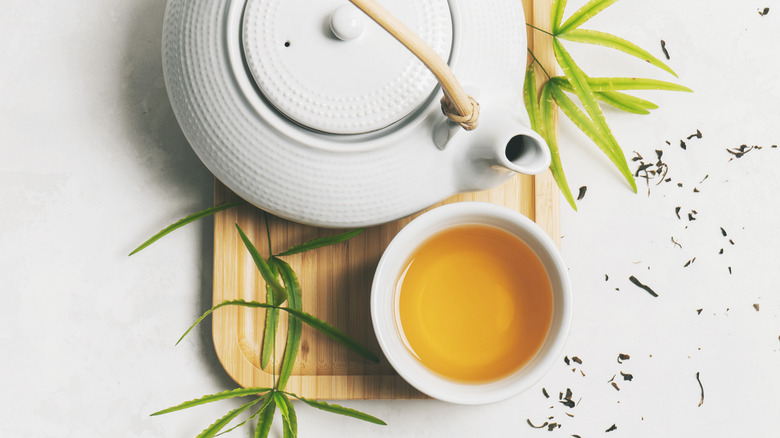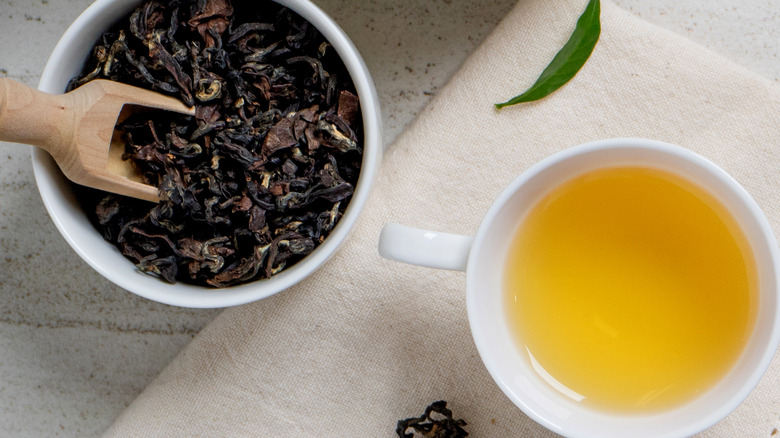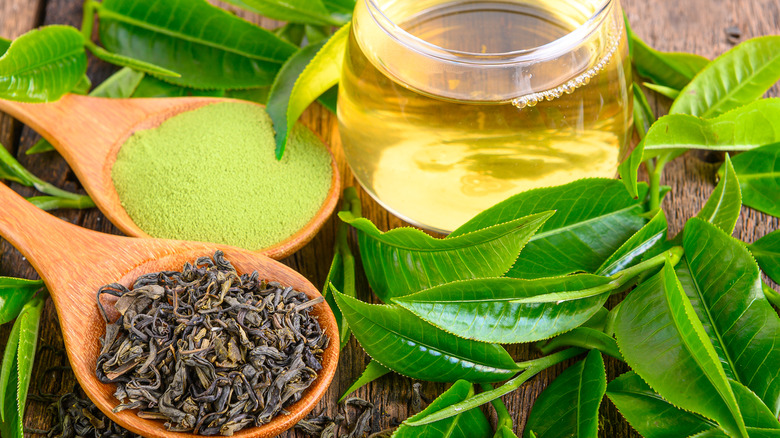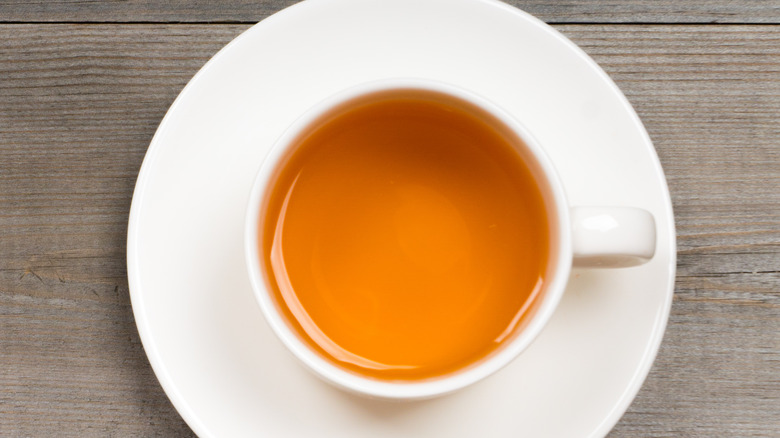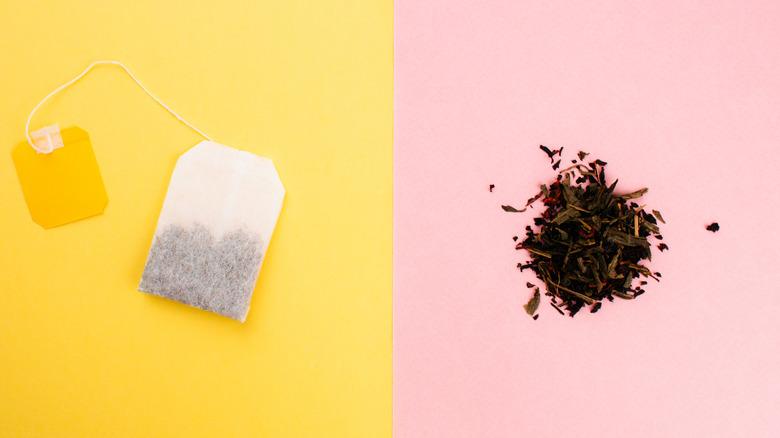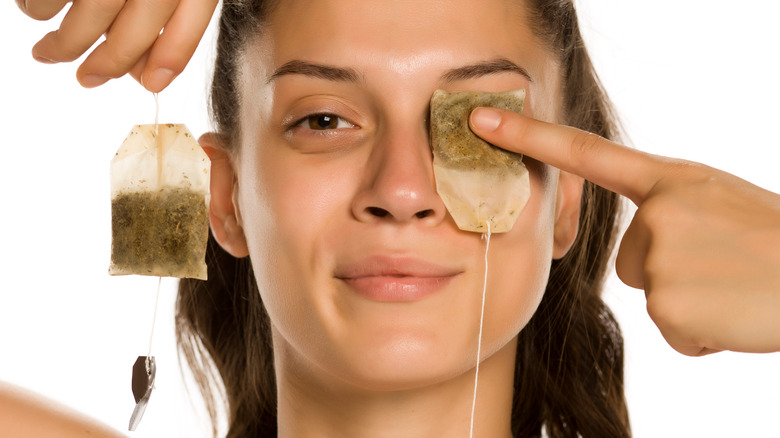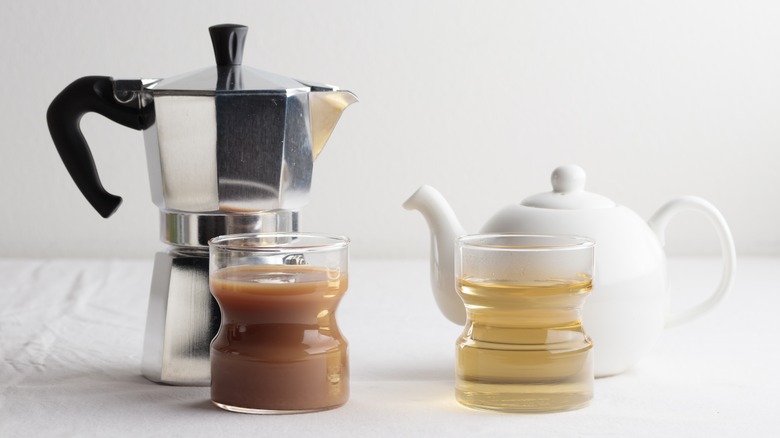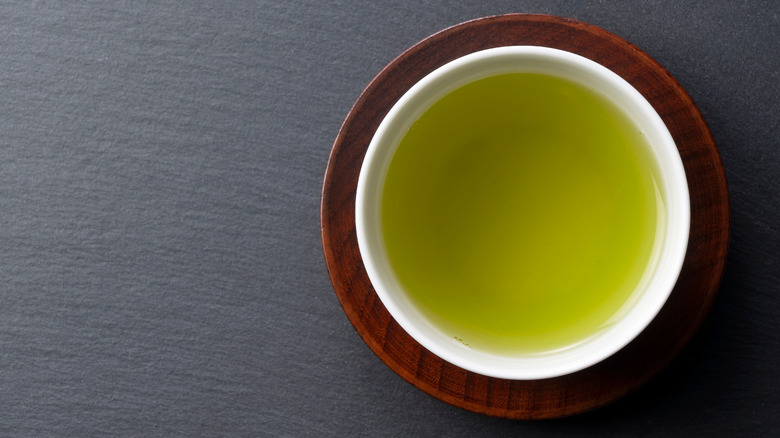How Your Body Changes When You Drink Green Tea Daily
Sipping a cup of tea — especially green tea — can be a simple way to just slow down for a few moments and relax. This is important, considering the nonstop hustle and bustle of every day life. Native to China and India, green tea is made from "unoxidized [Camellia sinensis] leaves and is one of the less processed types of tea," according to Medical News Today. It has been a staple in such Eastern regions for centuries. Over time, it eventually became more and more popular in the Western world.
Despite this fact, though, green tea accounts for only approximately 20% of tea consumption around the world. Nevertheless, its health benefits are numerous. Green tea is believed to help prevent or improve certain chronic conditions while also promoting mental health benefits. So, without further ado, let's take a deep dive into how drinking green tea regularly can actually change your body.
Drinking green tea daily could lower your risk of dying from cardiovascular disease
According to the Centers for Disease Control and Prevention, cardiovascular disease is the leading cause of death in the United States. Cardiovascular disease includes conditions such as heart attacks, stroke, coronary artery disease, and more.
A study published in the Journal of the American Medical Association aimed to investigate whether there was a link between drinking green tea and mortality due to all causes and due to cardiovascular disease by studying over 40,000 participants over several years. Researchers noted that extensive evidence in animals demonstrated green tea had heart-protective effects, so they sought to see if the same was true in humans.
Researchers found that participants who drank five or more cups of green tea daily saw a nearly 26% decreased risk of death due to cardiovascular disease, particularly stroke. The results were observed in both men and women; however, they were found to be more significant in women. While additional research is still necessary, the study builds a strong foundation on the correlation between cardiovascular-related death and green tea consumption.
Green tea consumption can decrease your bad cholesterol
Is your cholesterol too high? Green tea can help. A 2011 comprehensive meta-analysis published in the American Journal of Clinical Nutrition looked at 14 randomized control trials to see what type of relationship, if any, between green tea and cholesterol levels existed. They found that consumption of green tea did, indeed, result in a decrease (of 7.20 milligrams/deciliter) in total cholesterol levels and significantly lowered LDL ("bad") cholesterol. The review also found no significant change in HDL levels, or "good" cholesterol.
High cholesterol levels have been associated with an increased risk of developing heart disease and death due to stroke, so any decrease in too-high cholesterol levels is beneficial to your health and is recommended (via Centers for Disease Control and Prevention).
In addition to drinking green tea, eating a well-balanced diet low in saturated and trans fats, exercising regularly, and losing weight are a few other ways to help decrease cholesterol levels, according to the American Heart Association.
Drinking green tea daily may reduce your risk of developing type 2 diabetes
Type 2 diabetes is a public health concern as it is one of the most common chronic medical conditions. In both type 1 and type 2 diabetes, the body cannot regulate glucose, or sugar levels appropriately (via Healthline). Poor diet, lack of mobility, and genetics are all risk factors for developing type 2 diabetes. While typical treatment involves lifestyle and dietary modifications and oral medications, injectable insulin may be prescribed.
To minimize potential complications of type 2 diabetes, preventive measures are key. These include a well-balanced, low-carb, and low-sugar diet, as well as regular exercise. A healthy staple in the diet can also be green tea. A 2013 meta-analysis published in The American Journal of Clinical Nutrition found that drinking green tea "significantly decreased" participants' fasting glucose levels and hemoglobin A1c, a form of hemoglobin that is tested to confirm a diagnosis of type 2 diabetes (via Centers for Disease Control and Prevention).
Consuming green tea every day may promote weight loss
Green tea is the best kind of tea to drink if you want to lose weight. For starters, it has a moderate caffeine content, around 22 to 40 milligrams per cup (via Healthline). Caffeine is a known stimulant and helps promote fat burning and improves exercise performance.
Green tea also contains an antioxidant known as epigallocatechin gallate (EGCG), according to Healthline. And EGCG may just boost your metabolism. According to a study published in the American Journal of Clinical Nutrition, EGCG is believed to inhibit catechol O-methyltransferase (COMT). This leads to an increase in the neurotransmitter norepinephrine, which aids in thermogenesis, fat-blasting heat production, and fat oxidation. So if you have more norepinephrine circulating, you can see a boost in fat burning. The good news is that caffeine in combination with EGCG tends to have a synergistic effect on the metabolism and weight loss, making the duo stronger together than apart.
Green tea can help decrease inflammation
There is no denying the role inflammation plays in a wide array of chronic medical conditions. Ranging from mild skin conditions to severe autoimmune illnesses, inflammation can be detrimental to your health and overall well-being (via Healthline). Some good news: In addition to conventional anti-inflammatory foods and treatments like NSAIDs, green tea can also help decrease inflammation.
According to the Arthritis Foundation, green tea is viewed as one of the most beneficial beverages in terms of anti-inflammatory properties for people with chronic conditions, like rheumatoid arthritis. This is thought to be due to its high concentration of epigallocatechin gallate (EGCG). The foundation noted that EGCG is nearly "100 times stronger in antioxidant activity than vitamin C and E." Nevertheless, additional studies are still needed to evaluate just how effective of an anti-inflammatory green tea can be.
In addition to helping reduce inflammation internally, research has also shown that applying a green tea extract to the skin or taking the tea as a supplement could help ease inflammatory skin conditions such as acne, atopic dermatitis, rosacea, and more (via Healthline).
Green tea can help decrease bone loss
Osteoporosis is a disease characterized by a decrease in bone mass and a disruption of the architecture within your bones, leading to bone fragility and easy fractures, explained an article in Nutrition Research.
While four times more common in women, osteoporosis affects both sexes, and resulting fractures can lead to decreased quality of life, increased risk of death, and higher health care costs. For these reasons and more, proper management and treatment is necessary. While Vitamin D and calcium are always recommended, there are pharmaceutical drugs on the market to help treat osteoporosis. However, studies have also shown the benefit of incorporating green tea into people's diets, to help decrease bone loss.
The article continued, revealing that the many "bioactive ingredients" within green tea provide some bone protection against developing osteoporosis. Researchers also found that these effects "appear to be mediated through antioxidant or anti-inflammatory pathways and their related signaling pathways in the various cells comprised of bone compartments." So in addition to proper vitamin supplementation and treatment recommended by your health care provider, green tea may also be a welcome addition to your plan to help prevent osteoporosis.
Drinking green tea daily can boost your brain power
Green tea is believed to help keep your brain sharp and functioning smoothly, particularly because of its caffeine and L-theanine components (via Healthline).
In addition to being a stimulant, caffeine has been found by neuroscientists to affect mood, reaction time, and memory. The amino acid L-theanine helps to increase levels of neurotransmitter dopamine. Dopamine is responsible for aiding the functions of learning, motivation, attention, and more (via Psychology Today). Caffeine and L-theanine have a synergistic effect, which means when coupled together, they have more robust effects than if on their own.
A 2017 scientific review published in the journal Phytomedicine analyzed 21 studies and found green tea benefited human cognition and brain function. They found an increase in memory and attention, as well as increased activation of working memory in participants who consumed green tea. Promising results for the avid green tea drinker, for sure.
Green tea may lower your risk of these neurological disorders
Scientists have begun investigating any possible associations between green tea and diseases such as Alzheimer's and Parkinson's. One study, which was cited by an article in CNS Neuroscience and Therapeutics, found that people in the United States who drank at least two cups of green tea per day had a decreased risk of developing Parkinson's disease. Similar findings were observed in Japan; participants who consumed higher amounts of green tea were found to have a "lower prevalence of cognitive impairment."
This is, in part due, to the antioxidant epigallocatechin gallate (EGCG) found in green tea. While the antioxidants in green tea were initially thought to attack dangerous free radicals circulating the body, they are now thought of as, "multimodal acting molecules invoking a myriad of cellular neuroprotection/neurorescue mechanisms," according to the article. This means they may have huge implications for future studies regarding the ways they can be used as a potential preventative tools for cognitive and neurologic diseases.
Green tea can have a positive influence on your mood
Whether you are drinking it iced or piping hot, tea is part of a relaxing ritual that can make you feel calmer and instantly less stressed. Drinking tea can actually decrease levels of the stress hormone, cortisol (via Nature). In addition to decreasing stress, it can also help you manage symptoms of anxiety. The amino acid L-theanine in tea has been found to increase the activity of an inhibitory neurotransmitter GABA, which leads to reduced anxiety.
In an interview with Nature, Stefan Borgwardt, a neuropsychiatrist at the University of Basel in Switzerland, acknowledged the benefits of tea on improving people's moods but remained cautious, stating, "It's important not to overestimate the effects, although there is clear evidence of moderate improvements to mood in healthy populations, studies have yet to demonstrate that tea can help people with mental illness."
If you have been diagnosed with clinical depression or anxiety, do not kick any prescribed medications to the curb in favor of green tea. Instead, talk to your health care provider on whether it's a ritual or practice that may be incorporated within your existing treatment plan.
A cup of green tea each day can give you energy and make you feel more alert
Drinking a cup of green tea can be a relaxing experience, but it can also perk you up and boost your energy level. Or, as Andrew Scholey, a psychopharmacologist at Swinburne University of Technology in Australia, put it when speaking with Nature: "Tea is calming, but alerting at the same time."
A cup of green tea contains roughly 22 to 40 milligrams per cup compared to the 95 milligrams in coffee, according to Healthline. So while it packs a fairly stimulating punch, green tea is less likely to come with that unavoidable mid-afternoon crash often associated with a morning cup of joe. This also makes green tea a better beverage to sip on throughout the day, per Well+Good.
Drinking green tea regularly also helps sharpen the mind and increase alertness thanks to the l-theanine and caffeine — and all "without the jitters that some can experience with coffee," Well+Good explained.
Green tea may have some anti-cancer properties
Perhaps one of the most incredible findings about green tea and its contents is its noted anti-cancer properties. That doesn't mean you should consider green tea a treatment option for cancers, but the antioxidants found in green tea do have strong "free radical scavenging activity and may protect cells from DNA damage caused by reactive oxygen species," according to the National Cancer Institute (NCI). Plus, tea components have also been observed to "inhibit tumor cell proliferation and induce apoptosis," the death of potential cancer cells, in animal studies.
While animal studies have shown green tea's promise in preventing cancer formation in the skin, lungs, esophagus, stomach, liver, and other organs, the NCI stressed that human studies haven't been as conclusive and thus more robust studies are necessary. The NCI also noted that while several clinical trials have looked at green tea as a potential cancer prevention tool, not many have looked into tea components on "cancer incidence or mortality."
Drinking green tea daily may help you live longer
Could drinking green tea really be the elixir to immortality? Well not quite, but a study published in the Journal of the American Medical Association found that participants who drank green tea regularly had a decreased mortality rate due to all causes. This relationship was observed in both sexes, but it was stronger in women.
While it is not exactly known how green tea can decrease mortality and thus improve longevity in its drinkers, it may be partially due to the way it works as a preventative measure for other illnesses. As Healthline highlighted, "Given that some compounds in green tea may help protect against cancer and heart disease, it makes sense that it could help you live longer."
No, green tea is not a miracle "cure-all," but rather a delicious, simple, and healthy dietary modification that has numerous health benefits. And with various different preparation methods to try, green tea is easy to enjoy.
Is loose leaf green tea better than bagged green tea?
When it comes to making a cup of green tea, there are many different ways to enjoy it, including loose leaf and bagged. Is one form better than the other? Neva Cochran, a registered dietitian who spoke with Well+Good, recommended loose leaf green tea. She explained her reasoning to the publication, saying, "This tends to give you more of the leaf intact. Many of the green teas in tea bags look more like a dust than bigger pieces of the tea leaf, and you'll experience a greater benefit when the tea leaves are left more intact."
Suk-Yi, founder of Caffeine Trifecta, an online tea retailer, agrees. "Once exposed to the ambient environment, catechins degrade rapidly," she explained to Better Homes and Gardens. "The highly processed nature of 'dust and fannings' in tea bags degrade faster due to the higher surface area for exposure." She continued, saying, "It's best to drink green tea as fresh as possible, as loose leaf tea, to enjoy the potential health benefits of these phytochemicals." According to Cochran, though, you can still reap benefits from the finer, bagged tea as well.
You could get rid of bad breath
Not only can green tea potentially help you get a healthier mouth and teeth, but it may also contribute to better-smelling breath. Halitosis, another name for bad breath, can be caused by a number of issues, including poor dental hygiene, bacteria on the tongue, improper denture care, and health problems like diabetes or chronic bronchitis (per Johns Hopkins Medicine). Some research has pointed to the benefits of green tea in improving that pungent odor.
As mentioned, bacteria often plays a role in bad breath. One study published in a 2012 edition of the Jundishapur Journal of Natural Pharmaceutical Products found that a green tea mouthwash containing 1% tannin (an antibacterial complex in green tea) and 10% propylene glycol was effective at reducing mouth bacteria by 64%. Another study published in BMC Complementary Medicine and Therapies in 2015 found that green tea could be an important weapon against S. moorei, a bacteria largely responsible for halitosis.
You might experience fewer UTIs
Do you suffer from frequent urinary tract infections? If so, drinking green tea every day could be the remedy for your pain.
Urinary tract infections are caused by bacteria entering the urinary tract. When the bacteria reach the bladder or kidneys, a painful infection causing frequent, burning urination could be the result (via NHS). According to a 2013 study published in Frontiers in Microbiology, Escherichia coli causes as many as 90% of UTIs. Researchers tested the ability of green tea to fight E. coli, especially as it relates to UTIs, concluding that "even one cup of green tea could have an effect on a urinary tract pathogen, and drinking multiple cups over the course of a day could possibly provide a prolonged effect." The researchers also suggest that the ECG compound in green tea could be just as effective at combating UTIs as other antimicrobials.
However, it's important to note that caffeine may exacerbate symptoms of a urinary tract infection (per research in the American Journal of Epidemiology). Because green tea in its usual state has caffeine, you might want to consider how it could affect your symptoms. Switching to decaffeinated green tea might be the best solution.
Green tea might improve your skin when you drink it daily
Look through the skincare aisle at a local drugstore, and you'll probably find multiple products containing some variant of green tea, like dried green tea leaves or green tea extract. Why? Research has given some positive evidence of green tea's ability to improve oily, acne-prone skin, prevent skin disorders that may cause cancer, and reduce the effects of aging on the skin (via Healthline).
Anti-aging has been one of the most-studied topics relating to skincare and green tea, and there's lots of promising research showing that this tea can, in fact, improve the appearance and health of aging skin when used in cosmetics or skincare products. A 2020 study published in the European Journal of Integrative Medicine found that green tea showed anti-aging activities in skin fibroblasts and melanoma cells. Meanwhile, a 2013 study in Dermatologic Therapy found that experimental skincare formulas with green tea extract increased moisture and reduced roughness in the skin over time.
Your daily green tea could reduce inflammation
Inflammation happens when your body detects that something's wrong, like you get sick or have an infection. With inflammation can come mild to severe pain, and chronic inflammation can do serious damage to your body over time. Several forms of tea, including green tea, contain polyphenols, compounds with natural anti-inflammatory properties that could help people with acute or chronic inflammation find relief (per WebMD).
A 2016 scientific review in Anti-Inflammatory & Anti-Allergy Agents in Medicinal Chemistry explored green tea's effects on inflammation through clinical and epidemiological studies. Researchers found that in most of the studies, green tea had positive effects on inflammation. The review authors note that a compound in green tea known as epigallocatechin-3-gallate (EGCG) is likely largely responsible for its anti-inflammatory benefits in both humans and animals.
WebMD adds that green tea may even be able to help people with inflammation-related disorders, such as rheumatoid arthritis, irritable bowel syndrome, and high blood pressure.
Green tea might help you kick your coffee habit for good
Caffeine is in a lot of the food and drinks you might consume daily, like chocolate, soda, and coffee. According to the FDA, the average person should have no more than 400 milligrams of caffeine each day to stay within reasonable and healthy limits. But, if you're an avid coffee or soda drinker, that can be difficult to do. The Mayo Clinic notes that one 8-ounce cup of coffee has 96 milligrams of caffeine. If you typically sip on two or three 12-ounce mugs of coffee throughout the morning, you could easily go over the recommended daily limit.
However, an 8-ounce cup of green tea only has 28 milligrams of caffeine, according to the Mayo Clinic. If you're looking to cut down your caffeine intake but still enjoy a warm, comforting drink to start your morning, green tea could be a good alternative. A journalist named Hana Hong wrote about her experience of swapping coffee for green tea on The Healthy. After just five days, Hong saw a significant difference in her mood and physical health. She also noted better digestion, healthier skin, and improved hydration from her green tea experiment.
Drinking too much green tea can have side effects
While drinking any kind of tea is generally safe and without major side effects, it is important to be aware of what can happen if you have a sensitivity or reaction to it. Since green tea, in particular, has a high caffeine content, those with caffeine sensitivity may experience headaches, insomnia, irritability, or even nausea from drinking too much (via Healthline). As with all things in life, moderation is key.
Although very rare, the National Institute of Health explained that liver problems have occurred in some who've consumed green tea products. However, this is more likely to occur in supplement form as opposed to liquid form. The Institute recommends that people with preexisting liver diseases consult their medical providers before drinking green tea or taking green tea pills.
It is also recommended to speak with your medical provider to see if drinking green tea is safe with any medications you may be taking, particularly if you're on blood thinners. The amount of vitamin K in green tea can sometimes interact with blood thinners leading to potentially detrimental effects (via Medical News Today).
How much green tea should you drink each day?
Having too much of anything is usually not beneficial, and the same holds true with green tea. WebMD states that drinking more than a moderate amount of green tea — about 8 cups — daily could have adverse effects on your health, including typical side effects from caffeine consumption, like jitters and headache. Some people can also experience symptoms of liver injury if they consume too much. Healthline adds that the catechins in green tea may make it more difficult for your body to absorb iron from food, so people with or at risk for an iron deficiency should take extra precautions. Additionally, Medical News Today notes that people taking stimulant drugs may experience increased heart rate and blood pressure if they also drink green tea.
The best way to ensure that you're not overdoing it with green tea is to talk to your doctor. Be sure to let them know what medications you take and what other products you also use that contain green tea, if any, such as extracts, powders, or mouthwashes (via WebMD).

